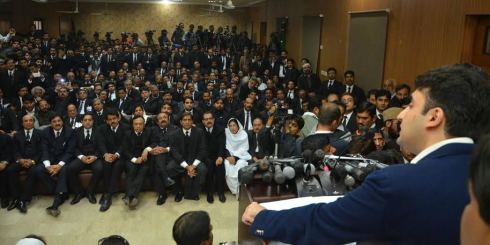 ‘Let us move on…’ Comes from a grandson standing in the hall of Lahore High Court that ordered his grandfather’s extra-judicial murder who gave this country its first unanimous constitution.
‘Let us move on…’ Comes from a grandson standing in the hall of Lahore High Court that ordered his grandfather’s extra-judicial murder who gave this country its first unanimous constitution.
They say he is too young to understand politics, but this 27-year-old outstrips the seasoned and experienced people relishing in the corridors of power when he bids to move on. He shuns the politics of vengeance when those older than half his age are either busy doing entire politics on sit-ins or dragging country back to the 90s. Even on the existential threat like terrorism, he turns out to be the most intrepid while the rest are still kicking the can down the road.
On 11th January 2016, Bilawal Bhutto Zardari addressed the Lahore High Court Bar dragging the heed towards ground realities that surround the country. The speech encompassed nearly all the pivotal affairs being discussed but what should allure much the attention is our judicial system – that never gets media firestorm.
Unnecessary suo-motos, selective justice, establishment of military courts to trial terrorists and then execution of juveniles and ordinary criminals instead – doesn’t it all render accusation of serious crimes on the judiciary? Keeping it concise, these are merely the recent acts; a single write-up would not suffice if we stretch back to the most heinous crime of executing an elected Prime Minister whose reference case is still in abeyance. But let us move on…
A system of accountability is an indispensable criterion for the independence of judiciary. But our judicial system lacks any and hence the absence of judicial accountability has further deteriorated the institution. There are annals of irregularities in the judicial system that are deliberately kept unrevealed. Here the clear-headed PPP Chairman weighs in: ‘it is in the nature of power to crave more power, judges are also humans and honorable judges as human beings cannot be exempt from this human frailty.’
Except him, how many voices do we hear demanding the accountability of judges? Individuals are rather hailed, by political leaders, as heroes for their unconstitutional acts serving mutual political interests. The accountability of the judges is necessary indeed as it will not only help safeguard the independence and integrity of the judges but also build the trust of masses.
The current judicial system does not meet the local conditions either and is in no way effective for the people. With thousands of cases pending till ages in the courts, lower judiciary, constitutionally bound to serve the commoners, has miserably failed to provide justice. For the majority, it is more of a penance to file a case due to high expenses and idle procedure. Hence it is the need of the hour to revise the system.
Though several such discussions have been conducted intermittently on different forums as how our judicial system is not up to par – the traditional politicians do not even pay heed to this serious issue – however, the one who appears to be looking at it through the prism of constitutionalism comes up with the solution as well. Manifesting his vision to strengthen democracy, Bilawal calls for the improvement of this organ of the state and recommends:
- Proper role of the President, the Prime Minister, the Parliament and the Bar Council in the appointment of judges.
- No unconstitutional interference of the Supreme Court in the government affairs.
- No consultation to be sought from the Chief Justice while appointing government officials as it is unconstitutional.
- Establishment of constitutional courts.
- Judicial accountability.
- Regulation of suo-moto powers.
- Improvement of the process of the civil courts and magisterial forums to provide justice to the downtrodden.
Had the above recommendations been made earlier by those responsible and taken into account, perhaps the political and judicial failure would not have resulted in the formation of military courts. But we have this custom of waking up at the tail end as we did in the case of terrorism. His cries were made irrelevant by initiating talks with the mass murderers, demanding offices for them, and eventually we came on his page after devastating more than hundred innocent lives of APS.
Right after a week of his address highlighting the pitfalls as well as the solutions to improve the justice system, today on 18th January, the former dictator Musharraf gets the acquittal in the murder case of Akbar Bugti delineating that, unlike politicians, Generals cannot be tried – that the ‘independent’ judiciary is not so independent to take on a former dictator. This clearly prophesies the utter failure of the judiciary and in its aftermath, the democracy will suffer.
So wake up before it is too late again. Before any constitutional subversion is validated, before another elected Prime Minister is dismissed, before more judicial crimes are committed, wake up! Fix the system so the public has confidence in both the administrative as well as the executive organs of the state.
